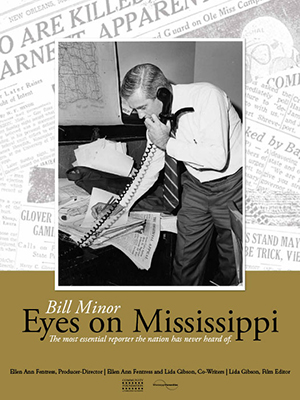
Film/Documentaries
“Eyes on Mississippi”

As the southern struggle for civil rights caught fire in the 1960s, its combustible core was Mississippi. Bill Minor became the state’s most fearless clear-eyed chronicler. His regular Times Picayune and, even more crucially, anonymous dispatches for The New York Times captured U.S. history, in contrast to most Mississippi coverage, white-supremacist propaganda masquerading as fact.
There were threats and opportunities for Minor to leave the state, yet he remained in Jackson, doggedly reporting from 1947 until the Trump administration. Eyes on Mississippi is a 56-minute film on the most essential reporter the nation has never heard of. Minor died in March 2017 at almost 95, producing his outspoken weekly newspaper column until his last illness.
The story of the impact of one reporter determined to call out racism and government dishonesty carries uncanny resonance in the nation today. Besides Minor, other crucial figures participate in the film: Presidential Medal of Freedom winner John Doar, New York Times journalist Claude Sitton, civil-rights leaders Myrlie Evers, former governor William Winter and Pultizer-Prize winner Hank Klibanoff. The film is a five-year project featuring historic footage and images from 19 archives located across the U.S. The documentary’s producer-director is Ellen Ann Fentress. Co-writer and film editor is Lida Gibson.
The documentary examines how Bill Minor witnessed—and occasionally shaped--U.S. history in his coverage of the civil rights movement. Legendary black leader Medgar Evers trusted Minor as the rare local white reporter with a sense of justice. Truth became costly. Three 1964 Freedom Summer volunteers decided to investigate a church burning in Neshoba County after Minor broke the story. The trio’s resulting murders helped awaken the nation to the stakes of the struggle.
Minor made his name as the New Orleans Times Picayune’s Mississippi correspondent. The documentary makes the case that some of his most crucial reporting, however, was his quiet, anonymous civil-rights coverage for The New York Times and Newsweek. The scant use of contributor bylines in the era kept Minor’s national work unknown to his Times Picayune employers. Despite his anonymity to national readers, he was an open secret to the national press corps, who depended on Minor for information.
The documentary explores how Minor’s position as a witness became a contribution of its own. The title Eyes on Mississippi has two meanings. First, it was the name of Minor’s long-time column, but it also was his strategy. The fastest route to change was getting the raw real facts of the struggle out. The more eyes on Mississippi, the more the pressure for transformation.
Minor won Harvard’s Louis Lyons Award for Conscience and Integrity in Journalism in 1966, as well as Columbia’s John Chancellor Award for Excellence in Journalism in 1997.
Screenings have been held by the New York Society for Ethical Culture, Princeton University, San Francisco Unitarian Universalist Society, Missouri School of Journalism, Bennington College, Tulane University, Atlanta History Center, Vanderbilt University, Washington College, University of Alabama, numerous other colleges in the South and the Overby Center for Southern Journalism and Politics. Contact info@ellenannfentress.com to schedule a screening. .
Donations may be made to:
The Eyes on Mississippi Fund
The Community Foundation for Mississippi
119 South President Street, 1st Floor
Jackson, MS 39201
Or online, specifying The Eyes on Mississippi Fund to https://formississippi.org/donate/
To follow on Facebook: https://www.facebook.com/Eyesonmississippiproject/
Coverage:
https://www.poynter.org/news/morning-mediawire-difference-one-reporter-can-make
https://www.nytimes.com/2017/03/28/business/media/bill-minor-dead-mississippi-reporter-on-civil-rights.html?_r=0
http://www.channelnonfiction.com/eyes-on-mississippi-a-new-documentary-about-how-one-journalist-fought-white-supremacy-in-mississippi-review/